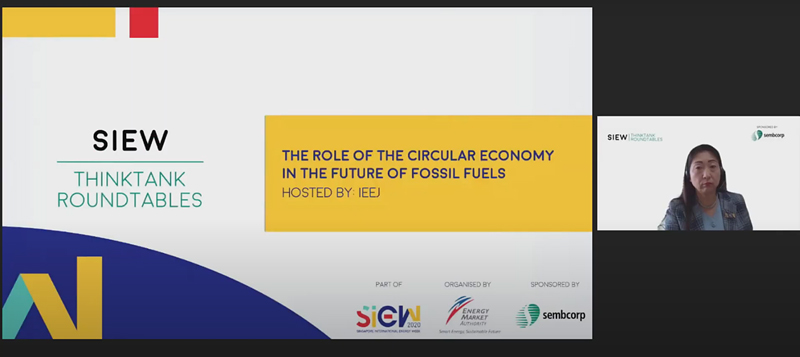The Institute of Energy Economics, Japan (IEEJ) led a thought-provoking discussion on the potential of a circular carbon economy to achieve energy transition. Chua Teck Joo reports.

If society is to thrive in a decarbonised world powered by renewables, nuclear and other clean energy, what is the role of fossil fuels? At SIEW Thinktank Roundtable I, IEEJ shared its annual outlook for decarbonisation scenarios and gathered a panel of experts to discuss the evolving role of a circular carbon economy.
Panel moderator, Ms Yukari Yamashita (Niwa), Managing Director, Charge of Energy Data and Modelling Center of the IEEJ, shared her studies on the Energy Outlook until 2050, discussing the different scenarios and what it means to achieve a Circular Carbon Economy (CCE). She highlighted that regardless the outcome, the reliance on fossil fuels will remain high in the year 2050 and far from achieving a zero-carbon economy.
Dr Arij van Berkel, Research Director of Lux Research, then shared the key advantages and disadvantages of achieving a CCE. He cited how recycling could help recover materials from plastic use as an advantage of the CCE model. However, he noted that carbon still would not be fully captured.
Mr Vipul Tuli, Managing Director of Sembcorp Energy India Limited, provided insights on how India—projected to be the largest incremental consumer of energy—was increasing its commitments to sustainability to achieve CCE.
These include reducing emission intensity by 33-35% by 2030, having 40% of total electricity capacity to be from non-fossil fuel-based energy sources and creating a carbon sink of 2.5 to 3 billion tonnes of CO2 through reforestation.

When asked which of the 4Rs of the CCE model was most applicable for his company in the panel discussion, Mr James Laybourn, Regional Business Development Manager, DNV GL Oil & Gas said “Reduce”, which is the most ideal way to decrease the impact of the carbon effects. “Remove” is also vital for the transition for companies, as CCE cannot be achieved overnight. Mr Laybourn believed that hydrogen would also play a big role in transitioning from oil and gas.
Fielding a question on whether the CCE is a concept that is suitable for Asia, Mr Yoshikazu Kobayashi, Senior Researcher at the IEEJ, said that it will bring a holistic approach to Asia’s development—bringing together economic growth and environmental actions.
In conclusion, Ms Yamashita said that the idea of the CCE would be further developed in the upcoming G20, where further discussions would be expected.
Follow us on Twitter (@SIEW_sg) to get the latest #SIEW2020 updates throughout the day!